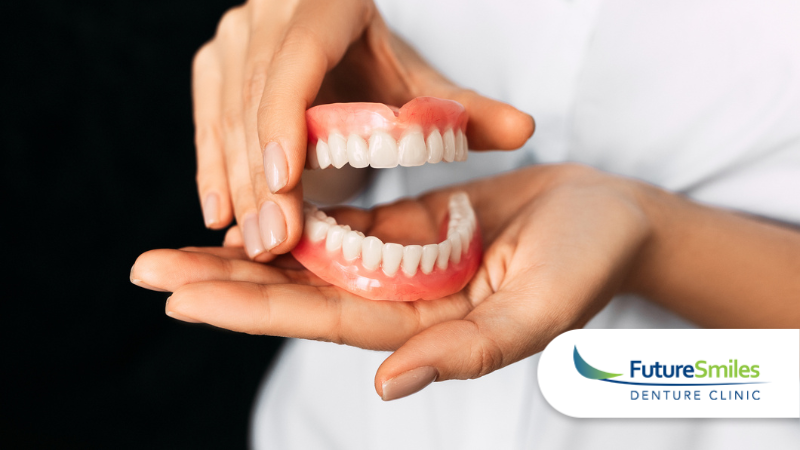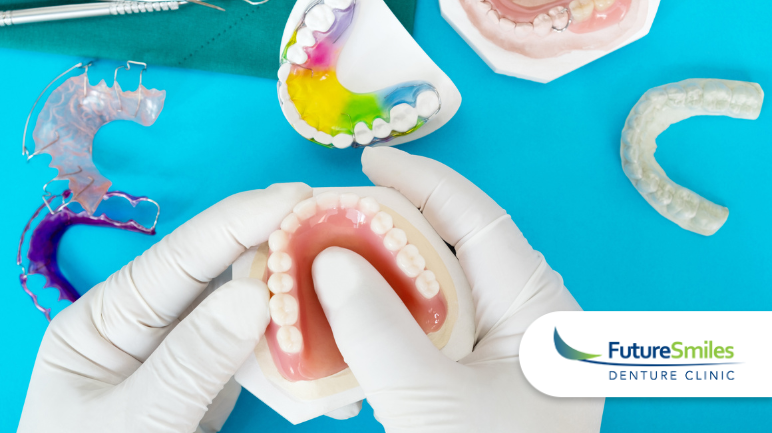For many patients, denture-supported implants are an advanced tooth replacement option which offers a natural-looking, long-lasting solution for missing teeth caused by age, injury, and/or gum disease.
However, it’s important to note that not everyone is a suitable candidate for this denture solution and there may be certain factors that affect your suitability, including:
- Inadequate bone in treatment area
- Presence of periodontal disease
- Bite complications
- Whether or not you’re a smoker
- Whether or not you take blood thinners
Want to Know if Denture Implants are Right For You? Book a Consultation
At Future Smiles, a leading Calgary denture clinic, we offer a wide range of tooth replacement options from traditional dentures to more modern solutions including flexible partials and implant-supported dentures to suit all needs, lifestyles, and budgets.
Want to know which one is right for you?
If I Choose Implant-Supported Dentures, Should I Be Worried About Peri-Implantitis?
When researching implant-supported dentures, you may have come across a condition called peri-implantitis, which can affect some implant patients. To clear up any confusion, here is a simple breakdown of the condition, its symptoms, and how we can help treat it.
What is Peri-Implantitis?
Peri-implantitis is an inflammatory disease that can lead to a gradual decrease in jaw bone around the area surrounding the dental implant. This could be due to many reasons including:
- A smoking habit
- Poor oral care
- Teeth grinding
- Oversized implant
- Vertical bone graft
Lowering your risk of peri-implantitis
If you take good care of your teeth and aren’t a high-risk patient, then the likelihood of developing peri-implantitis is low. Regular checkups with your dentist will also help ensure your denture implants stay in good condition.
Warning Signs of Peri-Implantitis
Peri-implantitis is always preceded by a much milder condition called peri-implant mucositis, which is completely treatable. Some of the signs of this condition include:
- Pain around the dental implant area
- Swollen lymph nodes
- Bad taste in your mouth
- Bleeding at the gum line
- Slight movement of your dental implant
However, this condition may not be symptomatic, so it’s important to go for your follow-up appointments when required. If it’s caught at an early stage, it’s entirely manageable, so regular check-ups are vital for the success of your dental implants.
Why Visit The Dentist Regularly?
How to Treat Peri-Implantitis
If you’re diagnosed with peri-implantitis, you may need to have your implants removed to clean the infected area and allow it to heal fully. How it’s treated will depend on the severity of the condition, but typically your dentist/denturist will try to:
- Normalise and control the harmful bacteria in the implant pocket
- Accelerate the wound healing process after the implants have been removed
- Accelerate the healing of any bleeding gums
If left untreated, peri-implantitis can have some unwanted consequences, of which bone loss is one, and may result in you losing your implant. That’s why it’s very important to treat this problem fast and efficiently.
Call Today
To find out more about the costs and benefits of dental implants, and how you can look after your teeth to avoid peri-implantitis, contact our Calgary denture clinic at (403) 475-0016 or fill in our online contact form.






